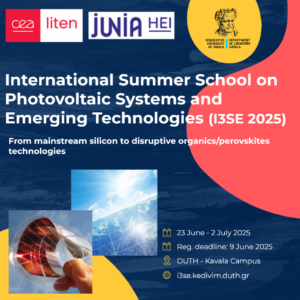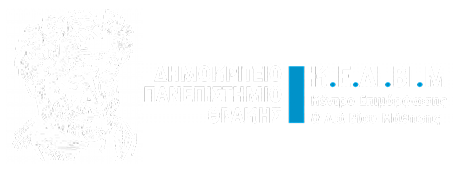Call of interest
Study Guide
Introduction
The Training and Lifelong Learning Center (TLLC) of Democritus University of Thrace organizes the Lifelong Learning Program entitled: “International Summer School on Photovoltaic Systems and Emerging Technologies” from 23/06/2025 to 02/07/2025, in collaboration with the INES Research Centre (France) and the Catholic University of Lille. The scientific coordinator is Professor Apostolidou Eleni.
The program’s purpose
The programme is implemented in English and aims to educate the trainees about the present and future of renewable energy sources (RES). The summer school has been developed for those interested in solar energy and its applications. In addition, the program is designed for those who intend to pursue an academic or professional career related to solar technology. This program is designed for students or graduates, technicians as well as researchers who wish to gain a comprehensive introduction to RES and more specifically to photovoltaic energy sources.
The summer school purpose is to:
– Specialize in the measurements of the characteristic sizes of different types of photovoltaic cells.
– Understand the basic principles of modeling and simulation of energy systems.
– Develop the ability to formulate, describe, numerically solve and analyse solar energy conversion processes using advanced numerical tools.
– Gain the ability to evaluate the technical and economic performance of photovoltaic modules and their integration into the energy system.
– Develop critical thinking about current renewable energy technologies and their benefits.
Unmet Educational Need for the Program
The development of an International Summer School on Photovoltaic Systems and Emerging Technologies is necessary due to a) the growing demand for renewable energy sources, especially solar energy, and b) the rapid development of photovoltaic technologies. As the world shifts towards sustainable energy, there is a significant need for a skilled workforce in solar energy systems. This project will address the skills gap by providing hands-on training and the latest knowledge on emerging technologies such as perovskite solar cells, solar storage and smart grid integration. Emphasis is placed on the latest generation photovoltaic, organic and perovskite technologies. In addition to the theoretical part, the workshop is ideal for all those who are already working in this field and need to deepen their knowledge about new developments, the industrial situation and market perspectives. Therefore, the summer school brings together participants from a wide range of professional and academic backgrounds, promoting global collaboration, allowing knowledge exchange between professionals, researchers and students from different backgrounds.
Key Learning Outcomes
Upon completion of the course, participants will acquire both theoretical and practical knowledge of photovoltaic systems, renewable energy technologies and their applications. The following knowledge, skills, and abilities will be acquired:
- a) Understanding of the basic principles of photovoltaic systems.
- b) Practical training/experience with photovoltaic systems.
- c) Understanding of the global energy landscape and the developing policy.
- d) Problem solving and development of analytical skills in relation to photovoltaic systems.
Target Audience
The programme is addressed to professionals, researchers and students (undergraduate, postgraduate, doctoral and postdoctoral students) of with a chemistry or engineering background such as chemical engineering, mechanical engineering, environmental engineering, electrical engineering and production and management engineering.
Categories of candidates accepted – Prerequisite knowledge/ Entry requirements
Applications for participation can be submitted by: engineering and chemistry students and graduates. Prerequisites are internet access, personal email and basic computer skills.
Program implementation
Mixed : The Programme will be implemented with the following forms of training:
– In person training (theory and workshops),
– Online material.
Training material
The trainees are provided with notes and digital material including videos and PowerPoint presentations.
Program Syllabus
Thematic Unit 1. Energy and Resources
Introductory course to energy, reserves and resources which covers the social, economical, environmental and technological background of renewable energy generation. Also, a comprehensive comparison with world oil and gas reserves and a first contact with the PRMS system will take place. Subjects such as: Energy consumption, GHG emission, renewable energy technologies (wind, solar, biomass, bio-fuel, geothermal, hydropower, wave, tidal current, hydrogen fuel cells) will be discussed. The goal of the course is to review the technological potential of renewable energy. At the end of the course the students will learn: How to reduce air pollution, how to decrease the dependence on coal, fossil fuels and nuclear, how to start, design and build a renewable energy system.
Thematic Unit 2. Photovoltaic Technologies (PVT)
Contents:
Part 1:
PV principles
Crystalline silicon based technology,
Types and conversion efficiency of different solar cells architecture
Part 2:
LCC of some PV installations
Principle of LCC calculation
Trends and issues: What’s Future?
Thematic Unit 3. Organic & Perovksites Photovoltaics (OPV & PPV) / Organic materials for photovoltaic applications
First, the principle of Organic and Perovskites technologies will be presented. The course provides an insight into the theory behind these technologies and describes the three main research areas within the field i.e. materials, stability and processing.
Beyond the theoretical aspects, the goal of the course about OPV/PPV is to give a clear pictures of the last industrial developments and market opportunities. The future of these last PV generations will be discussed with students on the basis of the key parameters (technical, cost, market, regulation, politics…) and compared with other PV and renewable technologies.
Thematic Unit 4. Photovoltaic System Applications (PVS) / LCC-LCA of various PV technology
Introduction on the design process for several complete self-contained PV systems and grid-tied systems
Contents:
Part 1: PV systems applications
- An overview of applications
- Stand-alone systems:
- Components and conversion chain
- MPPT
- System design
- Grid-tied systems:
- Integration of PV generators to the grid
- Conversion chain
- Power converters associated to grid-tied PV systems
- Regulations and policies
- Grid services
- Hybridization of electrical energy storage for intelligent integration of PV in electric networks
Part 2: Simulation of a case study
Thematic Unit 5. Modeling and Simulation in Energy Engineering (MSEE)
The aim of this course is to introduce students to the methodologies and tools involved in the modelling and simulation of advanced energy systems in general and PV systems in particular. The students should be able to (1) formulate, mathematically describe, numerically solve and analyse energy conversion processes, using advanced numerical tools and (2) perform techno-economic analyses for the integration of PV units in energy systems.
Thematic Unit 6. Photovoltaic Systems: Performance, Reliability and Emerging Challenges in O&M
The content of this course provides a comprehensive overview of the theoretical elements, key concepts, best practices and technical challenges related to the performance, reliability and O&M of PV systems. In Part 1, a particular focus is given on the better understanding and insights into: i) PV performance indicators, monitoring and forecasting methods and safety on the operational side and ii) PV reliability and underperformance issues in the field, diagnostics/inspections and preventive/corrective actions on the maintenance side. Part 1 closes with a presentation and discussion on recent technological advances and opportunities of the PV research community and industry in (and towards) the Industry 4.0 and Circular Economy eras. The part 2 of this course comprises of a practical example/case study, focusing on hands-on understanding of actual performance and reliability aspects in real-life operating PV plants. In this case, the return of experience from PV systems inspections will be presented, in an interactive way with (open questions from/to) the attendees of this course.
Teaching hours: 68
Total load hours: 175
ECTS credits: 7
Trainee Obligations/Certificate Acquisition
For successful completion of the program, participants must:
- A) Attend all teaching units. Absences cannot exceed 15% of the scheduled training hours.
- B) Successfully complete the assessment.
- C) Pay all tuition fees.
Upon successful completion of the program, participants receive a Certificate of Specialized Trainning, lasting 175 hours, equivalent to 7 ECTS credits.
Participants who have attended the program without exceeding 15% absences, paid all tuition fees, but have not succeeded in the assessment process specified by the program, will be awarded a Certificate of Attendance.
Faculty
- Dr Stéphane Cros, Department of Technological Research, French National Institute for Solar Energy, email: CROS@cea.fr
- Dr Ing. Dhaker Abbes, researcher teacher and co-head of Energy, Electrical and Automated Systems (ESEA) field in the engineering school HEI Lille, email:abbes@junia.com
- Dr Nikolaos C. Kokkinos, Associate Professor at the Department of Chemistry of Democritus University of Thrace, email:nkokkinos@chem.duth.gr.
- Dr Ioannis Tsanakas, Project Manager at CEA-INES (France), email: tsanakas@cea.fr
- Dr Mohamed MoezBelhaouane, Assistant Professor in power system control and renewable energy at JUNIA Group (High School of Engineering), Lille – Franc and member of the power system team at L2EP Laboratory (Laboratory of Electrical Engineering and Power Electronics), University of Lille. email: mohamed-moez.belhaouane@junia.com
- George Vythoulkas, Laboratory Assistant at the Department of Chemistry of Democritus University of Thrace, geovyth@chem.duth.gr.
Participation Cost
The participation cost amounts to 500 € and 300 € per person for students of DUTH. This amount can be paid in 2 equal installments of 200 € and 300 € (100 € for DUTH students), respectively. The first installment before the start of the courses in a Bank Account to be announced, the second by 09/06/2025.
Payment of the first installment is a prerequisite for participation in the program.
Offline, via bank transfer
Bank name: ALPHA BANK
SWIFT Code: CRBAGRAA
IBAN: GR81 0140 9000 9000 0200 1000 166
Beneficiary: EIDIKOS LOGARIASMOS KONDYLION EREVNAS DPTH
Applicants should mention “KE 30135 (KEDIVIM)”
Admission and Selection Criteria
The maximum number of trainees in the program is 40, and the minimum is 15.
For the evaluation of applications and the selection of candidates, the following criteria are followed: based on their CV and priority order in the application form.
Submission of applications and supporting documents
Applications open: 10/02/2025
Application deadline: 09/06/2025 or until vacancies are filled.
Extension of application deadline until 20/06/2025
The electronic application constitutes a Declaration of Responsibility according to paragraph 4 of article 8 of law 1599/1986. The candidate, with their application, unreservedly accepts all the terms of the program, as stated in the public invitation/study guide of the program, in the study regulation and in the operating regulations of TLLC-DUTH ((https://kedivim.duth.gr/operfr/).
The required documents that the candidate must submit for participation in the Program at a minimum are:
- Copy of identity card/passport
- CV
Objections will be accepted no later than 5 days after the publication of the list of admitted candidates.
In case the minimum required number of trainees is not reached, the Program Coordinator reserves the right to change the starting date of the program or cancel it, informing the trainees in a timely manner.
Contact details
For further information regarding the program please contact Dr. Zoi Metaxa at 2510 462 227, e-mail: zmetaxa@chem.duth.gr.
For more information: https://i3se.kedivim.duth.gr/index.php


